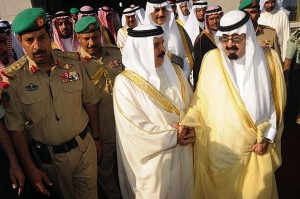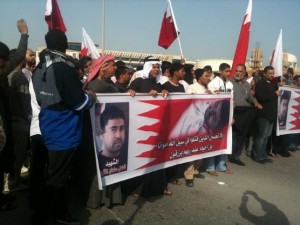Is a counter-revolutionary tide beginning to favour the “strongmen” of the Arab world, whose regimes appeared a couple of months ago to be faltering under the impact of the Arab Awakening?
From Libya to Bahrain and Syria to Yemen, leaders are clinging on to power despite intense pressure from pro-democracy protesters. And the counter-revolution has so far had one undoubted success: the Bahraini monarchy, backed by troops from Saudi Arabia and other Gulf states, has brutally but effectively crushed the protesters in the island kingdom. Pro-democracy leaders are in jail or have fled abroad. The majority Shia population is being terrorised by arbitrary arrests, torture, killings, disappearances, sackings, and the destruction of its mosques and religious places.
In three other countries despots under heavy assault have varying chances of survival. A month ago in Yemen it seemed likely that President Ali Abdullah Saleh was on his way out, but he still has not gone and has mobilised his own demonstrators, gunmen and security forces. Nevertheless the army has publicly split and the probability is that he will finally depart.
In Syria protests are continuing across the country despite frequent shootings, but President Bashar al-Assad will take a lot of displacing because of his determination to stay, the strength of his security apparatus and the tight grip on power of the minority Allawi community.
In Libya Muammar Gaddafi teetered on the verge of defeat two months ago when rebels had seized the east of the country and there were demonstrations in Tripoli. Since then he has rallied a core of support and the rebels in Benghazi would collapse if they did not have the backing of Nato airpower. Nevertheless he is likely to go simply because Britain, France and the US are committed to his departure.
All this is very different from what happened in Tunisia and Egypt, where the military and political establishments believed they could get rid of the regime but keep the rest of the state intact. This could not be done in Libya or Syria because the regime and the state are too intertwined.
In Yemen the state is too weak to get rid of the leader, while in Bahrain democracy means a revolutionary transfer of power from the minority Sunni to the majority Shia. The counter-revolution has other advantages. Its leaders are no longer being caught by surprise. Defenders of the status quo no longer think their defeat is inevitable and have recovered their nerve. They can draw on the loyalty and self-interest of state employees and on sectarian allegiances.
The attitude of outside powers to the overthrow of the status quo differs from country to country. The US was in two minds over support for Mr Mubarak, but did not condemn the Saudi armed intervention in Bahrain or the subsequent terrorising of the Bahraini Shia. Washington has a very different attitude to Arab autocracies in North Africa and far more strategically important Gulf oil states allied to the US. Unspoken also as a factor in US thinking is the degree to which revolution or counter-revolution will help or hinder America’s traditional enemy in Iran.
Only in Libya has the struggle between rebellion and the state turned into outright war. The rebels have plenty of support, but they still only control a quarter of the population and they remain militarily weak. Their most important card is Nato air strikes and even these have not enabled the anti-Gaddafi forces to advance beyond Ajdabiya or break the siege of Misrata.
The counter-revolution is showing that it has more going for it than seemed likely two months ago. This only appears surprising because well-established authoritarian regimes went down so swiftly in Tunisia and Egypt. Police states have had time to rally their formidable forces of repression, but even this may not be enough to quell newly politicised populations which believe they can end autocratic rule.
By Patrick Cockburn




















